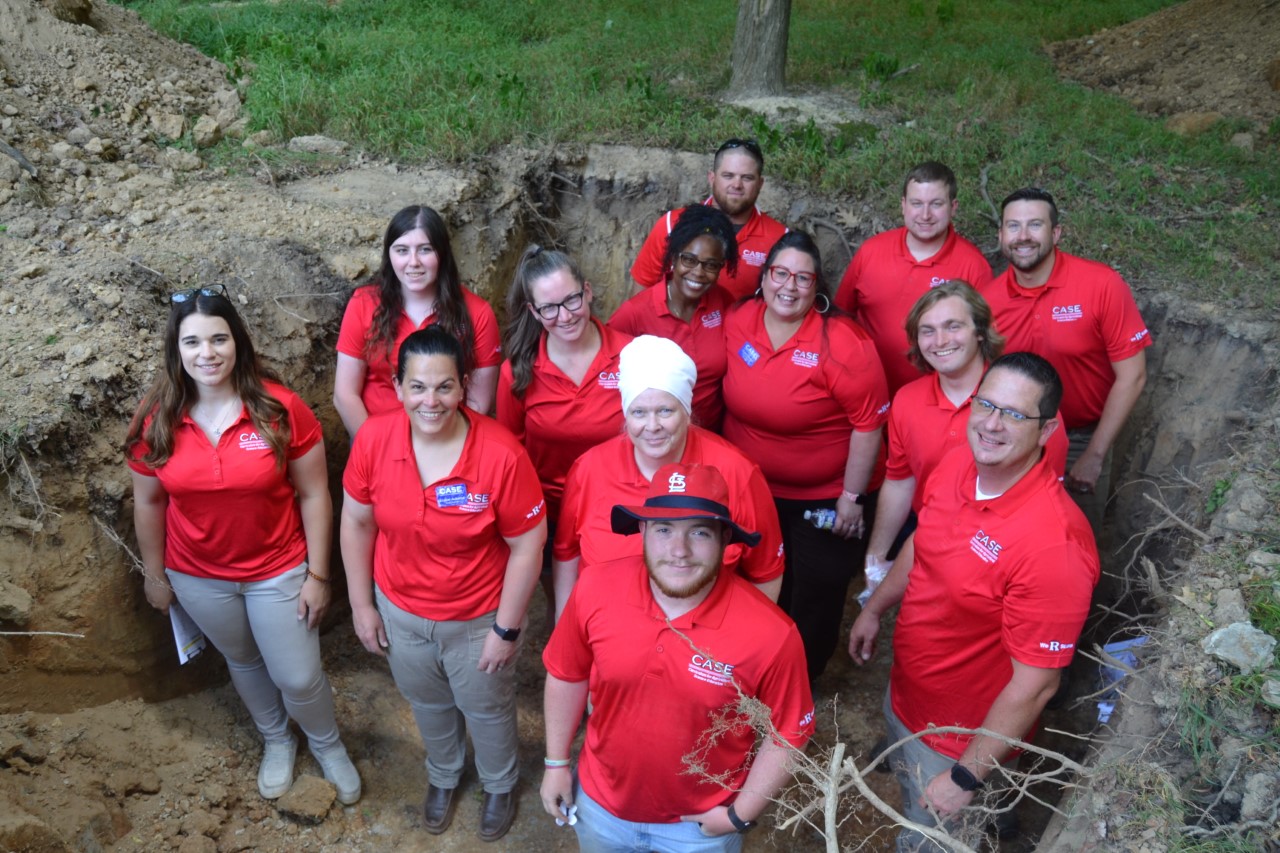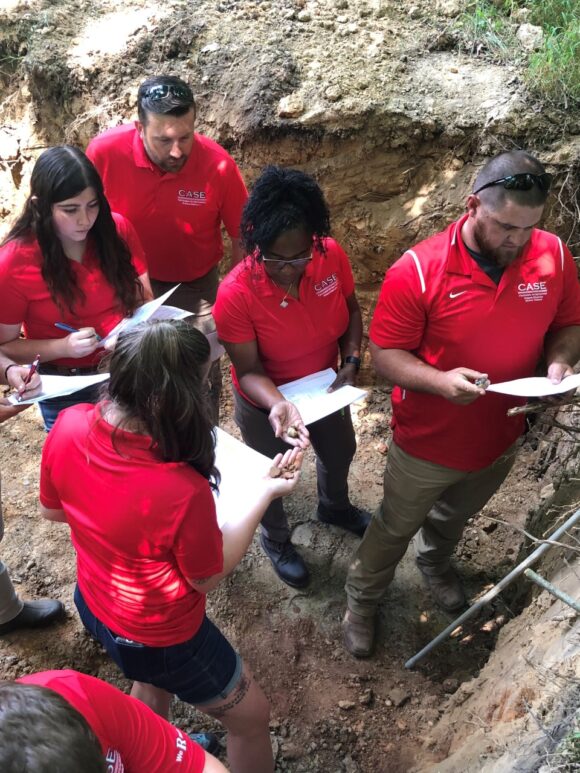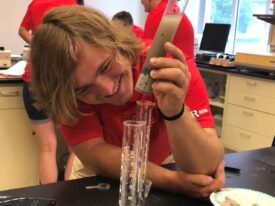
CASE Institute participants study soil horizons on the Cook Campus at the Rutgers School of Environmental and Biological Sciences.
More than a dozen high school teachers and pre-service teachers in training to become agricultural educators from across the U.S came to the Rutgers Cook Campus to attend the CASE Institute focused on the course, “Introduction to Agriculture, Food, and Natural Resources.” Held July 10–20, this institute was hosted by Rutgers School of Environmental and Biological Sciences (SEBS) and the New Jersey Department of Agriculture (NJDA), Office of Food, Agriculture and Natural Resources Education.
An initiative of the National Council for Agricultural Education, the Curriculum for Agricultural Science Education (CASE) is managed by the National Association of the Agricultural Educators.
CASE develops agricultural education curricula to help meet educational and industry standards. Teachers become certified to teach the courses at “CASE Institutes,” which are typically held during the summer months.
CASE Institutes are transformative, inquiry-based professional development opportunities for secondary school agriculture teachers to learn the curricula and become certified to teach that course. This year, there were 23 CASE Institutes being held at a number of locations across the nation.
“We appreciate the excellent CASE Institute conducted by Rutgers and the NJDA Office of Food, Agriculture and Natural Resources. This high quality teacher professional development prepares teachers for a full year of STEM-enhanced agriculture curriculum delivery to students,” said Nancy Trivette, director, National CASE Initiative. “As a New Jersey native and Rutgers alum, it gives me great pleasure to know New Jersey is using CASE to prepare students for college and careers in the agriculture industry.”
“By hosting a 2022 CASE Institute on the Cook Campus, Rutgers fulfills its mission as the land-grant institution in New Jersey to train the next generation of agriculture educators,” said Thomas Leustek, Dean of Academic Programs at SEBS.

L-R: Nicole Sickler, Delaware Valley University student (NJ); David Bittner, Milton Area High School (PA); Shazel Muhammad, Camden Dream Center Technology Training School (NJ); Ethan Johnson, Williams High School (AZ); and Emily Sztaberek, John Jay Senior High School (NY – back to camera), study soil horizons on the Rutgers Cook Campus.
“Agricultural educators serve a vitally important role for the future,” he explained. As the U.S. and the world become more urbanized, fewer people know where their food comes from and how it is produced and delivered to their grocery shelves, yet all humans are dependent on food production.
“It is vitally important to expose young people to agriculture and let them know that there are satisfying and rewarding careers in agriculture and the many fields that touch on agriculture,” Leustek added.
The typical CASE Institute spans 70-90 hours of intensive, rigorous programming representing an entire semester or year of instruction for each unique CASE course in a collaborative setting.
“CASE transforms agriculture programs and teachers. From the scaffolding and spiraling of the lessons to the increased rigor of the content, students are exposed to high-quality, industry-validated curriculum,” said Erin Noble, New Jersey State Program for Food, Agriculture and Natural Resources Education/State FFA Advisor, New Jersey Department of Agriculture. “Organizing the CASE Institute for teachers from across the country has been rewarding, especially as I watch them work through the material and become empowered to give more to their students.”
Rutgers CASE Institute attracted a diverse range of participants, some of whom travelled from states as far away as Arizona and Washington, but all with a desire to use the hands-on experience to grow their competency in teaching ag education to the next generation.
Selah High School teacher Chuck Burger traveled from Washington State to attend the Rutgers CASE Institute. “The journey through the CASE certification has really opened my eyes to the value of having connections. Through CASE, I will be connected to an amazing curriculum and a national network of professionals. All these connections will bless the lives of my students and facilitate my ability to promote lifelong learning.”
Closer to home, Shazel Muhammad is affiliated with Camden Dream Center Technology Training School in New Jersey. “The CASE curriculum will increase rigor in my classroom. It will free me from creating lesson plans to focus on creating teaching plans.”
Pre-service agricultural education student, Owen Donnelly, is a 2022 SEBS graduate who majored in Agriculture and Food Systems/teacher education track. He is currently in his fifth year at the Rutgers Graduate School of Education in the 5-year Agricultural Science Education program leading to certification to teach agriculture in New Jersey.

Owen Donnelly (SEBS’22) and Rutgers Graduate School of Education student in the lab during the CASE Institute.
“CASE helps ensure that my lessons will be rigid, but also engaging, interesting, and scaffolded in a way that my students can understand. Plus, in my case as a pre-service teacher, it makes me much more marketable to potential employees,” said Donnelly.
A lot was riding on the Rutgers CASE Institute for Ethan Johnson of Williams High School, AZ. “The Case Institute at Rutgers will mark the start of our Ag Program Back in Arizona. Having the opportunity to come and be trained be professionals and have access to such an awesome curriculum, insures the future of Agriculture students everywhere.”
Milton Area High School teacher David Bittner underscored the value of the experience. “A CASE certification validates what we teach in agricultural education by providing an engaging and rigorous curriculum aligned to national standards that articulates to post-secondary institutions, provides credentialing opportunities, and fosters career and college readiness.”
To grow interest in preparing more agricultural educators, SEBS offers a dual credit program whereby high school students who have successfully completed specific courses that are certified by CASE can receive college credit for comparable courses offered by Rutgers SEBS, if they matriculate at SEBS.
“There is a severe shortage of agricultural educators in New Jersey, as there is across the nation. This year, there are eight open positions in the state. There are very few careers where I can guarantee students will be able to obtain a rewarding job. Agricultural education is definitely one of them,” added Leustek. There are multiple pathways to becoming an agriculture teacher in New Jersey. In partnership with the Rutgers Graduate School of Education (GSE), teachers who complete the CASE Institute can receive GSE credit.
For information on the CASE program, contact Thomas Leustek at leustek@sebs.rutgers.edu.

